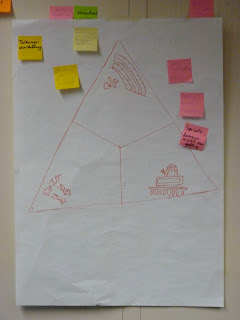As some of you know, I started to teach at the
University of Applied Sciences Berlin this semester. One of my courses is called
Softwareproject I (and will be continued by
Softwareproject II with the same students), in which the students should work in groups and do what they are expected to do later in the in the IT industry:
Build Software.
In the next months, I will try to write down my experiences with this course, because I think that we do something special, since we will try to create large teams of six to nine students (yes, that's a fairly large number at the university) and do
Scum, a popular candidate of the agile methodologies. Applying Scrum in an university context exposes many challenges, and I will try to address some of them in future posts. One of that challenges is the lack of
real projects. For me, a real project is a project with a
real customer. And a real customer is someone who is driven by the market. So in a perfect world, I would have enough real projects for all of my students (~30) to work in. And guess what, sometimes the world
is perfect. I started to search for companies with these characteristics:
- have the courage to work with (potentially unexperienced) students
- propose a project which fits to the experience level of the students
- agree to apply Scrum and provide a Project Owner
I found an overwhelming number of seven(!) companies with seven projects who want to work with us:
And if this wasn't anough, I also found sponsors and supporters:
- agile42 will give us free Scrum lessons, which is really great because of their experiences with introducing Scrum in many companies
- ScrumDo, providing a web-based Scrum tool, supports us with business accounts
- github, a hosting service for git repositories, supports us with business accounts for private repositories
- a friend of mine, Olivera Janackovic, desgined the banner you can see at the top of this posting especially for that course
For the start, the world seems perfect. My students can decide which project they want to work in, an after that we will start to build the teams. Next week, I we will try to have the Project Owners of the chosen projects to come to our lessons, so that the teams can start to work on a detailed vision for the project and its architecture.






